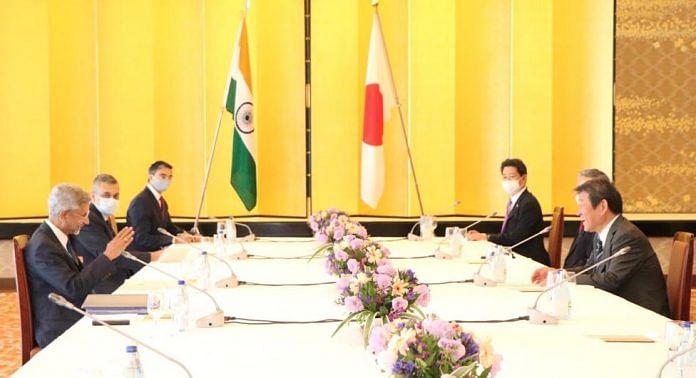New Delhi: A day after the Quad countries led by the US came down heavily on China, leaders of India and Japan Wednesday discussed the strengthening of security ties and supply chain resilience with an eye on Beijing.
The issues were discussed during the 13th India-Japan Foreign Ministers’ Strategic Dialogue held in Tokyo between External Affairs Minister S. Jaishankar and his Japanese counterpart Motegi Toshimitsu.
“Discussions covered our cooperation in manufacturing, skills, infrastructure, ICT and health. Our special partnership can make a big difference in post-COVID recovery,” Jaishankar tweeted after the meeting.
Just concluded India-Japan Strategic Dialogue with FM @moteging. Conveyed warm birthday greetings. Discussions covered our cooperation in manufacturing, skills, infrastructure, ICT and health. Our special partnership can make a big difference in post-COVID recovery. pic.twitter.com/lm1tjhOzPG
— Dr. S. Jaishankar (@DrSJaishankar) October 7, 2020
No dates, however, were officially announced for the India-Japan Annual Summit. The summit was scheduled to be held in December last year, when the then Japan prime minister Shinzo Abe was to visit Assam. But it had to be cancelled due to massive unrest in the state over the Citizenship Amendment Act.
Yoshihide Suga is the new Prime Minister of Japan.
Jaishankar had called on Prime Minister Suga Tuesday and asserted the importance of a “free and open” Indo-Pacific.
India and Japan, in an effort to bypass China, discussed ways to engage the 10-member ASEAN (Association of Southeast Asian Nations) and Australia to create a parallel network of supply chain linkages in terms of business and trade.
According to a statement issued by the Ministry of Foreign Affairs of Japan, both ministers “reaffirmed the importance of implementing Japan-India cooperation in third countries such as ASEAN and Southwest Asian countries”.
The role of ASEAN nations — Singapore, Malaysia, Vietnam, Philippines, Indonesia, Thailand, Myanmar, Cambodia, Laos and Brunei — is increasingly becoming critical even as they begin to stand firm against Chinese aggression.
“They emphasised that a free, open and inclusive Indo-Pacific region must be premised on diversified and resilient supply chains; and in this context, welcomed the Supply Chain Resilience Initiative between India, Japan, Australia and other like-minded countries,” stated a press release issued by India’s external affairs ministry.
Talks of creating a parallel network of supply chains, and diversification of trading in goods and services, have gained momentum due to the onset of the Covid pandemic as well as China’s increasing assertive policies around the world.
Also read: Jaishankar, Pompeo meet in Tokyo, discuss ‘peace & security’ in Indo-Pacific
Collaboration in a third country
India and Japan Wednesday also reiterated the need for collaborating and developing projects in other countries.
One such project is the development of a container terminal in the crucial Colombo Port of Sri Lanka, which is also part of China’s mega Belt and Road Initiative (BRI). Sri Lanka is a key country in the Indo-Pacific initiative.
“Explored further expansion of our third country collaboration, with focus on development projects. Reviewed global situation and developments pertaining to UN reform. Our shared commitment can help realise stability, security and prosperity in the Indo-Pacific,” Jaishankar said.
The idea for a third-country collaboration was mooted during the last summit meeting between Modi and Abe in 2018.
Both sides also discussed the ongoing bullet train project during the meeting.
The 508-km Mumbai-Ahmedabad bullet train project that will be built at a cost of around $12 billion was officially inaugurated by PM Narendra Modi and his then Japanese counterpart Abe in September 2017. It is being built in India with Japanese ‘Shinkansen’ technology.
The project was announced in December 2015, and has been facing delays over acquisition of land and political issues in Maharashtra.
“Japan is a close ally of the US. They are not jettisoning that alliance for anyone. Tokyo knows how to play the options and PM Suga will also walk the fine line between the US and China and will expect India to do the same. However, what is key right now is economic integration and how Japan is dealing with China going forward,” said Brij Tankha, professor of modern Japanese history, Delhi University and an honorary fellow at the Institute of Chinese Studies.
Also read: India discusses Rohingya refugees issue with Myanmar as Bangladesh’s ‘close neighbour’




All talk ……………………………………no fight !!!